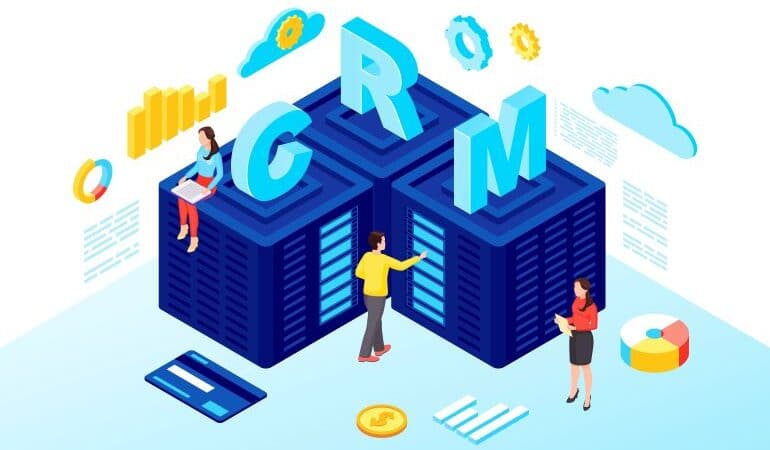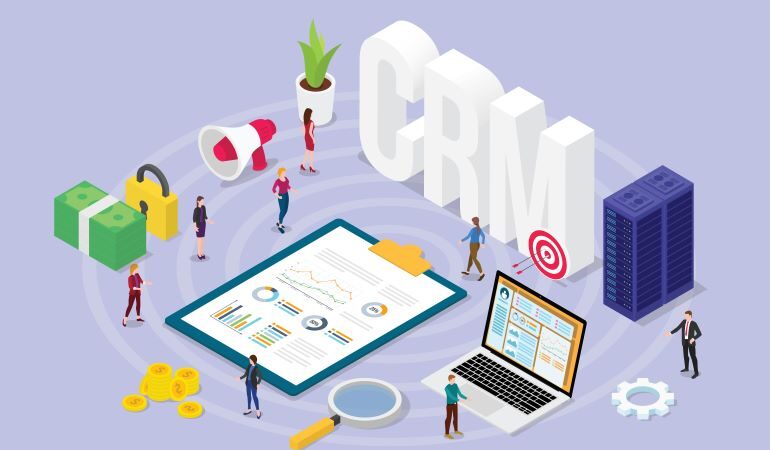As we’ve discussed in the past, one of the main purposes behind introducing CRM software is to raise the bar of your sales team. As a central database, a CRM solution does more than collect valuable information about all interactions. It also helps a business learn more about its customers and target audiences. It is based on that information and other essential CRM metrics that your marketing and sales teams can perform better. And in this article, we are focusing on the CRM processes that boost sales efficiency.
8 CRM processes that boost sales efficiency

1. Defining target audiences
One of the advantages that CRM gives is the ability to document how customers discover your brand and how they interact with your content. And this process gives businesses a unique perspective on what the goals and needs of their customers are. For those willing to look into it, you can find everything you need to position your product in the decision-making process of the consumers.
Therefore, the ability to define the inner needs and expectations of your customers and to give them identity is one of the CRM processes that boost sales efficiency. After all, it’s much easier to make a sale to someone you know and understand than it is to make a sale to a complete stranger. By knowing your customer, you know exactly which buttons to push and how to present your product as a solution for them instead of a payout for you.
2. Classifying leads
Just like generating and gathering leads are important processes for running a business, classifying those leads is essential for sales teams. Without going through the process of defining whether a lead is worth the time and effort, a business can end up wasting resources. It’s like choosing to take 3-point shots instead of going for the easy lay-up. And one of the functionalities that a CRM offers is to help qualify strong leads from the weaker ones. All you need to do is go through the following questions:
- How well does the lead match your ideal customer? When you understand who your customers are, you can identify just how strong a lead fits into that general description.
- How strong is the intent to make a purchase? The ability to differentiate between intent and interest to buy is a crucial trait for a good salesperson.
- How engaged is the lead with your marketing efforts and blogs? It’s always simpler to make a sale to someone familiar with your work than to someone that knows nothing about it.
- Is anyone else in your team already working on converting this particular lead? One of the many uses of having a central database for running your business is the ability to monitor internal processes. When you see someone else working a lead, you won’t waste your time on that same lead.
Asking and answering these questions helps optimize your sales process. It also boosts overall productivity and guarantees that the sales team works in harmony. And it all comes from the notion of CRM processes that boost sales efficiency.
3. Monitoring the sales cycle
Knowing your way around a CRM can provide you with a clear image of the average sales cycle for your business. And this can be a valuable educational piece of knowledge to possess and provide your sales team with. Tracking various sales opportunities and how they progress is an educational tool that a company can use to improve its overall approach to the sales process.
The bigger your company and sales team, the harder it becomes to monitor each aspect of it. When we discuss CRM processes that boost sales efficiency, we need to consider the layout of your sales process, from initial contact to conversion. Defining the checkpoints inside that process can help your team not only map out the process but also monitor each segment separately. And by defining each stage, you can identify potential flaws more easily and focus more efforts and resources on improving that particular stage rather than re-invent the entire sales process.
4. Keeping contact records
We’ve already discussed the importance of gathering data about all your leads and devoting time to defining and classifying customers. The next important stage is to store all that information. Why? Because there is a lot that your sales team can learn from historical data and previous interactions with customers. It not only helps identify target audiences but also helps you pinpoint weaknesses in your sales cycle and approach. It can also help in evaluating the individual performance of each member of your sales team.

This is a particularly important process for companies that offer a variety of products or services. Keeping records of past interactions gives your sales team a perspective on what the lead in question showed interest for in the past. Sometimes, you will be able to use that to upsell the same product or service. Other times, you will be able to complement their previous purchase with a brand new product or service. Either way, you will walk into the sales process with the high ground.
5. Proposal tracking
The manner in which you create and manage your proposals can pave your road to success. And when you are able to integrate proposal management software with your CRM, you are able to get a firmer grasp on closing deals with potential clients. Every progress that’s made after the proposal has been made, you can log and use it to take further action.
6. Logging deals
Each deal that you close is an additional piece of information that you can use to predict future sales opportunities. Your sales team can learn a lot from it, and avoid any potential mistakes, adding it to our list of CRM processes that boost sales efficiency. The ability to forecast the behavior of potential customers makes it easier for your team to make informed decisions and to allocate time and resources in the most effective way. When put together, all this leads toward an optimal sales process.
7. Documenting customer feedback and objections
Every experienced salesperson understands the potential drawbacks of this line of business. Obstacles are necessary as you go through the sales cycle. Finding new and innovative ways to overcome such obstacles is one of the traits of good sales teams. However, not all people might find the same positive experience in a certain service or product. And this can often end with complaints and/or objections from customers. Moving companies understand the appeal of proper customer services and its importance for building a brand.
One of the ways how your sales team can contribute here is by documenting claims and complaints from previous customers. They can then use those issues to account for them in future sales scenarios. That way, you will have a sales team that can predict the negative reactions from customers and prepare an educated response for each. As one of the CRM processes that boost sales efficiency, this is also important when passing a lead from one sales rep to the other. It makes for a smoother transition.
8. Sales team performance evaluations

Every system that hopes to grow as time goes by needs to be willing to work on its skills and overall performance. That is where coordinating, monitoring, and evaluating individual and team performance comes into play. By conducting regular evaluations of your sales team, you can easily identify the weak links of the team, as well as potential areas where improvement can lead to more sales. The way CRM fits into this process is that it makes it easier to keep track of the statistics for each member of your sales team and to compare those results with the overall scores.
Give your sales team the strong foundation they need to perform better
Based on what was said here, you can clearly see how the implementation of the right software can take up the level of your sales efficiency. The fact is that certain processes can make it easier for your sales department to establish a strong collaboration with other teams while giving leads exactly what they want. MoversTech CRM is a solution that offers an approach that tailors to the specific needs of the moving industry. And we are here to help guide you through these and all other CRM processes that boost sales efficiency.
- Schedule a demo today and start focusing on improving your business from the inside.
Stay Informed
Subscribe for industry
news & updates
"*" indicates required fields

